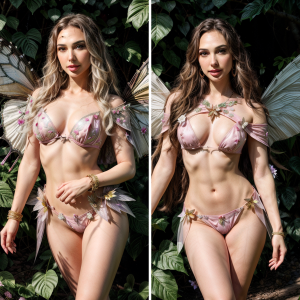Gal Gadot’s portrayal of Wonder Woman has undeniably changed the landscape for superhero films, charting a bold new course for the genre. Her embodiment of Diana Prince, the Amazonian warrior, brought a refreshing and much-needed shift to the superhero narrative, offering audiences a hero who is both powerful and compassionate, strong and empathetic. With Wonder Woman, Gadot didn’t just play a superhero—she became a symbol of female empowerment and a role model for a generation that longed for a more inclusive and nuanced portrayal of women in film.
When Wonder Woman debuted in 2017, it became an instant cultural milestone. The film’s success not only shattered box office records but also proved that audiences were hungry for a superhero who transcended the typical male-dominated stories. Directed by Patty Jenkins, Wonder Woman placed a female character at the center of an epic narrative, where she wasn’t just a sidekick or love interest but the hero who saves the day. Gal Gadot’s performance was key to making this happen. With her background as an Israeli Defense Forces combat instructor and her natural poise, Gadot brought authenticity to the role. Her physicality was impressive, as she performed many of her own stunts, but it was her ability to balance Diana’s strength with vulnerability that made her portrayal so compelling.
The film introduced audiences to a different kind of superhero—one who fights with compassion as much as with physical prowess. Diana’s journey, from her sheltered upbringing on the island of Themyscira to her experiences in the human world, was marked by a deep sense of morality and justice. In Wonder Woman, Diana is driven by her belief in the goodness of humanity, even in the midst of war and chaos. Gal Gadot perfectly captured this idealism, making Diana relatable and inspiring. Unlike many other superheroes who are often motivated by revenge or personal tragedy, Diana’s motivation stems from her love for the world and her desire to protect it. This positive and hopeful outlook made Wonder Woman stand out in the often grim and gritty landscape of superhero films.
The success of Wonder Woman not only redefined what a superhero film could be but also opened doors for more female-led superhero stories. Before Wonder Woman, female superheroes were often relegated to supporting roles or reduced to clichés, but Gadot’s portrayal showed that female heroes could be complex, dynamic, and just as iconic as their male counterparts. The film’s box office performance silenced critics who doubted the commercial viability of a female-led superhero film, paving the way for future films like Captain Marvel and Black Widow.
Moreover, Wonder Woman inspired a global conversation about representation and inclusivity in Hollywood. Gal Gadot’s performance, combined with Patty Jenkins’ direction, highlighted the importance of having women in key roles both in front of and behind the camera. The film’s success was a testament to the fact that diverse stories resonate with audiences and can achieve critical and commercial success.
For Gal Gadot, Wonder Woman was more than just another role—it was a personal mission. In interviews, she has spoken about how much the character means to her and the responsibility she feels in portraying a hero who can inspire women and girls around the world. Gadot’s genuine love for the character shines through in every scene, making her portrayal of Wonder Woman not just a performance, but a cultural phenomenon.
In the end, Wonder Woman charted a new course for superheroes by presenting a hero who embodied both strength and compassion, paving the way for more inclusive storytelling in the genre. Gal Gadot’s unforgettable performance continues to resonate, proving that Wonder Woman’s message of hope, love, and justice is more powerful than ever.





